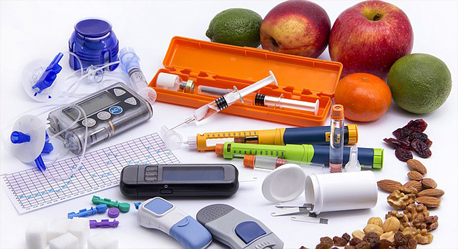Type 1 Diabetes
If you have type 1 diabetes are you currently expecting a baby or have a child 6 months or younger or pregnant and have a child with type 1 diabetes already? We need you for the ENDIA study to help find out what causes type 1 diabetes. To find out more.
People with type 1 diabetes have a lot to think about when it comes to staying healthy. After working with children, adolescents and adults at Flinders Medical Centre’s Diabetes Education  Unit, Jayne understands the needs of people living with type 1 diabetes are different to those living with type 2 diabetes.Different people need different information and support at different times in their life.
Unit, Jayne understands the needs of people living with type 1 diabetes are different to those living with type 2 diabetes.Different people need different information and support at different times in their life.
Continuous glucose monitoring and interstitial monitoring have made a big impact on the management of diabetes. These devices are designed to gather glucose levels over an extended period of time so you can get a thorough understanding of your diabetes.
The Dexcom 6 is now available in Australia. It is easier to administer and new features make it easier to prevent hypoglycaemia.
 Then there is the Libre Interstitial monitoring system. This device’s sensor is now much thinner and provides extra information for people to make informed decisions about improving their diabetes care.
Then there is the Libre Interstitial monitoring system. This device’s sensor is now much thinner and provides extra information for people to make informed decisions about improving their diabetes care.
If you are a NDIS client you may be eligible for the funding of these new technologies to improve your understanding and capacity to care for your diabetes.
Sometimes people with type 1 diabetes can get busy living their life and forget to keep up with their health reviews. Jayne works with people to identify the actions a person can take to make a difference to their version of diabetes.
https://jdrf.org.au/complications-um-that-should-be-diabetes-related-health-issues/Top 10 Tips
Have a look at some of the ways Jayne has worked with people with type 1 diabetes to help them get back on track with their diabetes. She might be able to help you in a similar way!
The Australian Government supports people with type 1 diabetes who are 21 years of age or older to access Continuous Glucose Monitoring through a National Diabetes Services Scheme … find out more here.
Book an appointment (Jayne@edhealth.com.au) to discuss the options today!
Consider these other options!
- Check, think and act on their blood glucose levels with a new meter
- Dosing insulin for carbohydrate intake with basal/bolus insulin regimens
- Get on top of the emotional side of type 1 diabetes
- Problem solving when things go wrong
- Learn more about their diabetes – it is easy to forget things when you are newly diagnosed!
- Learn how to manage sick days
- Review their insulin regimen, in consultation with their doctor, to see if changes are required to insulin type and dose
- Review insulin delivery device for the best fit for a person
- Management and prevention of other health problems that may be a part of diabetes
- Pre-pregnancy planning
- Providing a partner more information on managing hypoglycaemia
- See the new technologies to manage type 1 diabetes (e.g. continuous glucose monitoring, insulin pump therapy, interstitial or capillary blood glucose monitoring systems)
- Use a loan continuous glucose monitor that reviews interstitial glucose readings and reports the results every 5 minutes over a 1-2 week period to trouble shoot when difficult to work out what is causing their levels to be unstable (individuals purchase the disposable part of the equipment and pay for their session)
Clinics are available in three locations.
Click here to find out if diabetes education could can help you.
Contact Jayne Lehmann for an appointment.
